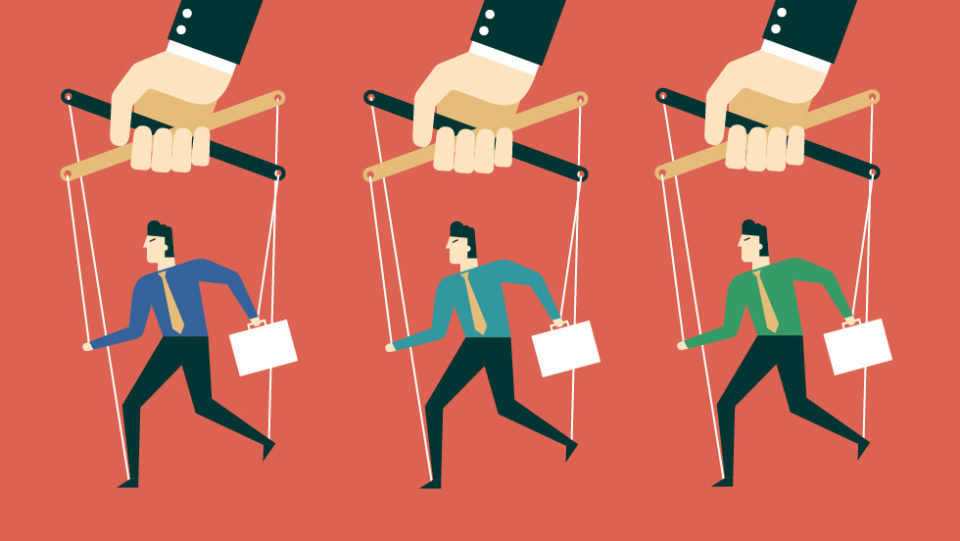
Employees can’t do their best work if they’re stressed out all the time, and one of the largest sources of stress in the United States is…the workplace. On this episode of the FRICTION podcast, Stanford Professor Bob Sutton is joined by Jeffrey Pfeffer, a professor at the Stanford Graduate School of Business and the author of Dying For A Paycheck. Together they discuss how much of the friction found in large organizations actually stems from an excessive attempt to control employee behavior. Be on the lookout for these key takeaways:
- Give up a measure of control and trust your employees to get their work done.
- Let your team know you are looking out for their well-being by instilling it in your culture.
- Hoping to stay innovative? Reconsider layoffs.
Bob Sutton: Hi, I’m Bob Sutton. I’m an organizational psychologist and Stanford professor, and this is the FRICTION podcast. On today’s episode, we’re joined by Jeff Pfeffer. Jeff is a professor of organizational behavior at the Stanford Business School, and the author of Dying For A Paycheck, which was just released earlier this year. We invited Jeff to the podcast to share his research on the toxic effects of unpredictable and overly-demanding workplaces. Listen up, because we can all play a part in ending what Jeff calls a public health crisis. So when you hear the word, or the phrase, organizational friction, what comes to mind? Bad friction, what do you think about… This is like a word association test, or something.
Jeff Pfeffer: Well, I’ll probably fail the word association test, but what comes to mind when I hear the word friction is all the things that organizations do to get in the way of… To do something that we wrote about, once together, turning knowledge into action, and also that gets in the way of people doing what they know they need to do. So friction, for me, would include things like useless meetings, of which there are many. Friction, to me, would include things such as bosses who micromanage and tell you what to do so that you can’t do what you know you need to do, and have to spend too much time fighting with your boss. So organizations really are filled with friction, and a lot of friction I think comes from organizational attempts to excessively control behavior.
Bob: That was actually lovely, and it’s something if you read Jeff Pfeffer’s work you can learn more about. Okay, so, Dying For A Paycheck. Not a very optimistic title, you gotta admit, Jeff. So why don’t we start out for our listeners, can you kind of just lay out the basic argument? So, why is this a problem, what are some of the causes?
Jeff: Sure, I can lay out the argument in a sentence. The workplace is killing people and no one cares. And I actually think that the second part of the sentence is worse than the first part. The workplace has actually become a public health crisis, not only in the US but around the world. If you are worried about health care costs, if you are worried about health inequality, if you are worried about the health of people, which is of course related to health care costs, you need to pay attention to the workplace. Not the only thing you need to pay attention to, but you do need to pay attention to the workplace, cause the workplace is where people spend a lot of their time, where they earn their living, where they get their social identity, where they run into all kinds of things that actually make them ill, stressed, et cetera, so therefore, if you’re serious about reducing health care costs and making people healthier, one place to focus on is the workplace. A very important environment.
Bob: So, the book is called Dying For a Paycheck, let’s get to the death part first and then we’ll untangle things. Cause you had some really specific causes that we believe are interesting from an organizational friction standpoint, but since your book is called Dying For a Paycheck, you gotta admit, you can be a very dramatic person. So, help us, give us the evidence that organizations actually are killing people, cause our listeners wanna know, “Is this guy full of it, or has he got some evidence?”
Jeff: Well I’m full of it, but I also have some evidence.
Bob: Combination.
Jeff: So I did a lot of the research, not the stories and the other stuff, but a lot of the primary statistical research with two colleagues at operations research and we began by identifying ten workplace exposures which by the way, don’t cover all of them, and in fact, we left out one of your favorites, which by the way has enormous health effects, workplace bullying.
Bob: Yeah, abusive supervision, incredible cost, for example.
Jeff: Abusive supervision is very, very costly and very bad for health. And we also left out discrimination based on race, gender, national origin, which also turns out, by the way, to have health effects. But for the ten workplace exposures, we combined the results of all of the statistical analyses for each exposure on four healthcare outcomes. Mortality, as you mentioned, do you have a physician diagnosed illness, what’s your self reported physical health, and your self reported mental health. And we did these meta analyses, combining all these statistical things, and having finished all these meta analyses, my friend Stefano Zinio said, “Nobody knows what an odds ratio is, so we need to benchmark this against something.” And we sat around for a little minute and thought, and he said, “Let’s take second hand smoke.” Second hand smoke is a known and regulated carcinogen, and it turns out, when you compare our ten workplace exposures to second hand smoke, you find that most of them are as harmful to health–
Bob: Individually, not collectively?
Jeff: Individually.
Bob: My goodness.
Jeff: As second hand smoke.
Bob: Really?
Jeff: Yes, really. We have a chapter on that, we have a table on that also. And, when you add ’em all up, you come up, well, our estimate which was a paper published in Management Science, suggests 120,000 excess deaths per year from the workplace, which would make the workplace the fifth leading cause of death in the United States. Worse than Alzheimer’s, worse than kidney disease.
Bob: Okay, so I’m going to ask you a hypothetical question, which you probably can’t answer with your data, but if you had the choice of having a really great boss, it’s an open office environment, and you gotta sit next to this boss, really great in terms of allowing you control, not excess job demands, a predictable schedule, these things that come out of your book, a really great boss, but he or she smokes, versus the worst possible boss who doesn’t smoke, and you gotta sit next to ’em, so you’re saying you should take the one who smokes, according to your data?
Jeff: Yes.
Bob: Now that is just amazing.
Jeff: It isn’t amazing.
Bob: It’s amazing.
Jeff: Particularly it should not be amazing to you, because you’ve written a book, you’ve actually now written two books. One was called The No Asshole Rule, one’s called The Asshole Survival Guide. You understand, you do understand the importance of work environments, broadly defined, and in this case, well now we define around a particular dimension of the work environment. You understand how important this is. If you take the emails that people have written you that caused you to write your second book, and think about the psychological and physiological consequences of the pain that is represented in some of those emails?
Bob: You make a very strong case that organizations often don’t care. But then, you make the case that they actually should care. So from a pure productivity, performance standpoint, why the heck should they care, assuming that they’re all completely heartless? Which I’m not willing to say that, but apparently you are, so…
Jeff: They’re not all heartless.
Bob: Most of them.
Jeff: Many of them are. So, here’s why they should care. Number one, not surprisingly, surveys show that workplace stress is related to turnover. And we know that turnover is costly. So when you make people stressed, you make people sick, they quit. And that costs money. Secondly, many of the things that organizations are doing that make people ill or die turn out not to benefit the organizations either. So one of the big issues in life is economic insecurity, including layoffs. We know that layoffs kill people. There are tons of studies of this, the death from heart disease goes up on one study by 44% in the four years following a layoff. Suicide rates could more than double following layoffs. So, layoffs clearly are bad for people’s health and their sense of security. Do they help organizations? The evidence suggests that they don’t. Work hours, the Economist magazine has this lovely chart. Per hour, productivity, number of hours worked. It’s linearly down. Per hour productivity goes down the more hours on average a nation works. So it’s not like we’re working you harder and we’re getting something out of it. When you’re exhausted, you don’t do very good work. And the final example I would use would be job autonomy. For 40 years, maybe even longer, our friend is now unfortunately deceased, Richard Hackman wrote about job autonomy as one of the core job dimensions, that people with more autonomy in their job are more engaged, they’re more motivated, they’re more productive. The opposite of job autonomy is an absence of job control. Which turns out to contribute to heart disease.
Bob: Who’s responsible for fixing this?
Jeff: I think, of course, companies are responsible. But if companies aren’t going to be willing to do what they should do, then the government needs to decide, as by the way, they are kind of in the UK but they’re not quite there yet. If the government decides that we do have a health care crisis, and the healthcare crisis is coming in part from what goes on in the workplace, we need, as we did years ago with respect to physical, Occupational Safety and Health Administration has driven down significantly injuries from misuse of tools and ladders and chemical exposures. The Occupational Safety and Health Administration will tell you, if you call them and find the right person to talk to who’s not afraid of getting fired, that they understand the health effects of workplace stress and they are prepared to intervene and drive that down. But of course, in today’s political environment, it’s not going anywhere. So one of the questions is, why is there so little apparent care about people? And, you know, one of the expressions of one of my friends at ESADE, the business school in Barcelona, uses is, “Why do we care more about polar bears than human beings?” I think the assumption is, compared to trees or polar bears, that humans are agentic and can take care of themselves, that if you don’t like your job, you can quit, that if your employer is mistreating you, you can speak up, that you have options, and that trees or polar bears aren’t able, so well, to take care of themselves. The assumption is, you can take care of yourself, we don’t need to look out for your well being or your welfare. The average employee, if the average employee finds that they are in a workplace that is making them ill, and they will know it, they may need to quit. And people say to me, “Well, you know, many people can’t quit.” And I say to them, I say, “If you were in a room that was filling up with smoke, and you said to me, ‘what is your solution?’ And I said, ‘leave the room,’” You would not tell me they can’t leave the room. You would tell me, “in a room filling up with smoke, they would leave the room.” I’m telling you that many working conditions are as toxic as second hand smoke. If it’s that toxic, you better leave.
Bob: Let’s start out with layoffs. So, the health effects aside, I thought you had some really interesting arguments about… Layoffs actually make things more difficult for everybody. Why is that? Cause it’s like you do the cost, you figure out how much it is, if you have half as many people, aren’t you making more money?
Jeff: No, because in many instances, first of all, when you announce a layoff, most organizations do it the wrong way. They announce a layoff, nobody knows who’s gonna get laid off, so everybody goes to look for another job and the best people probably leave. That’s number one. Number two, and this does go to your issue of friction, if you think about, what does it take to get a product out the door? In a company, you have to have collaboration maybe between the design, and engineering, and manufacturing, and marketing, and finance, and this collaboration or coordination often is based upon a set of people who have worked together over a long period of time. And so there are studies that show that innovation goes down in the presence of layoffs, cause you break up these collaborative networks, and now I have to get you in marketing to do something, but I don’t know you, you don’t trust me, and so it makes it much harder to get anything done.
Bob: So it’s the decrease in familiarity, and the decrease in trust, too, actually.
Jeff: Right, correct.
Bob: So that’s an interesting argument, because when you have that sort of instability, and everyone always talks about virtual teams and everything, but you’ve kind of got the combination of not knowing one another and having good reasons not to trust anybody.
Jeff: That’s correct. In the olden days, layoffs were done mostly for companies in financial trouble. Today, layoffs are done just period, you know.
Bob: Just standard operating procedure.
Jeff: Just standard operating procedure. They become regular, if you’re not doing layoff, what’s wrong with you? In many instances, layoffs are not being done by companies in financial stress. But even if you’re in financial stress, one of the ways that the famous organization Lincoln Electric has never had a layoff is if enough of your compensation is variable compensation based upon profits, it will naturally adjust as profits go up and down so Lincoln Electric has never had a layoff. Southwest Airlines, in a very cyclical industry, has never had a layoff. So it is possible, if you don’t overgrow, if you don’t over hire, if you have a piece of the compensation that will adjust when profits go down, that profit sharing part goes down, it is possible to avoid layoffs. Xilinx, the semi-conductor manufacturer, for a long time avoided layoffs. So the question is whether cutting people is the first thing you would do, or the last thing you would do. And for many organizations, it’s the first as opposed to the last.
Bob: So, there was some interesting evidence from Bane that showed that companies that did fewer layoffs, or didn’t do layoffs at all, bounced back much faster from the 2009 meltdown, and the reason’s actually pretty obvious, because, well, first of all, they don’t have to hire and retrain people. And second of all, they’re viewed as a more attractive employer because they don’t lay off people, so they can actually hire better people, too. So there are some upsides to it. One thing I thought was really interesting was especially in the gig economy world, is this idea of irregular and unpredictable work. Cause to me, that’s sort of the… Talk more about that. So, in addition to the health costs and the morbidity and everything that you document, why is that bad for the organization, just having employees on call, they can bring them in any time, you know, it’s just like having food on the shelf. Whenever you want it, it’s there. Like, what’s wrong with that?
Jeff: Well, first of all, you have to ask who is likely to want to work under such circumstances? Not necessarily people who have good alternatives. So again, people face in their lives mortgage payments, which do not vary, they face family obligations, which do not vary, they face other food and shelter, whatever, obligations that do not vary, so the fact that their work hours may be varying week to week, or maybe even day to day and therefore their income varies week to week and day to day, is experienced by most people, is extremely stressful. And you do not do your best work when you’re stressed.
Bob: Essentially, the way I read it, is if people are always on, or they’re always having to be vigilant because things are shifting, that essentially they’re in this state of alert at all times, so it’s both friction and fatigue which ultimately has negative effects on the organization. Is that fair?
Jeff: That’s exactly correct.
Bob: We’ve mostly been talking about the problems. Now, in your book, thank goodness, you’ve got some–
Jeff: My editor made me do it!
Bob: “My editor made me do it!” You’ve actually got some optimism. So, oh gosh, let’s start out at kind of the organization level. Cause even you said that not all organizations are bad.
Jeff: Which is correct.
Bob: So tell us the story about an organization you like that actually buffers people from some of these harms.
Jeff: Well there are a number. One of them, which is probably something that many of your listeners would have heard of, is some of the ones that they had to have heard of, would be Patagonia. I mean, Patagonia… And it starts with a philosophy. The head of HR told me that they measure the percentage of women who, when they have children, then return to work at Patagonia, and its about 99%, which is of course much higher than the norm. And part of that is… They provide all kinds of accommodations for mothers who have returned to work so that if they have to take a business trip, they will send somebody with the mother to take care of the kid. They will do a bunch of things to try to make it possible to not lose their human capital. So if it’s mothers, you’ve gone to work, you’re a woman, you’ve gone to work for Patagonia. I figured out that you’re a good employee, you like the organization, you’re useful, you’re helpful, you’re productive, and then you say, “Well, I’m gonna have a kid.” To lose you means that I now have to start the training and enculturation process all over. I have to take the risk of hiring somebody else. It is much more efficient to keep someone there who knows the organization, who you know, who they know you, and is an effective employee. And so they try to do many things to buffer that. He also told me this story. He used to work for Sears.
Bob: Now that’s a change. Ha ha, our favorite company.
Jeff: He was at Sears, one time when he was working at Sears, he got an email at about four o’clock on a Christmas Eve, he responded at about nine o’clock the next day, which of course would be Christmas day, he got a complaint. “Why did it take you so long to respond?” And I asked him, “What would happen “at Patagonia if somebody did that?” He said, “We’d fire them!” I mean, so, this is trying to build a culture in which the expectation is that as a leader, you are going to look out for the wellbeing of your employees.
Bob: So, you’re Jeff Pfeffer, and you’ll love this. You are all powerful, just for five minutes, in just a fantasy. You’ve got two magic wands, okay. The first wand is that you can sort of touch… Let’s just say every Fortune 500 CEO, and you have absolute power, and they’re going to change their organization, this is gonna reduce friction throughout corporate America. What’s the one thing you’re gonna have them do?
Jeff: Give up control.
Bob: Ooh, why?
Jeff: Because, a lot of the friction, you know this better than me, I mean, I don’t know anything that you don’t know better. Most of the friction in organizations come from practices that they have installed to maintain more control than they need. You’ve gotta fill out the budget forms, you’ve gotta go through the budgeting process, you’ve gotta report on every one of your expenses 14 times. You’ve gotta submit receipts. You’ve gotta do a thousand things which basically say, “I don’t trust you.” And if I trusted you, I wouldn’t put you through this. A lot of the practices that get in people’s way of doing their job and cause them to spend more time doing what they need to do than necessary is because of his excessive control.
Bob: Okay, so this is something you know a lot about. So, what is it about being in those powerful positions that stop them from being more reasonable?
Jeff: I did the research with Robert Cialdini, now, 20 years ago, that showed that every decision that somebody was involved in making they thought was a better decision because of their involvement. They felt better about themselves, they felt better about their subordinates, they felt better about the decisions that they made, in this case the advertisement they produced, so everything you do is better for you having touched it.
Bob: So, just to give people some context, Robert Cialdini is famous in the word of influence, and Jeff and some students, they did a study that essentially showed that the closer that a boss watches somebody work, the better they think the work is regardless of the quality of the work. So those of you who are managers out there, if you’re watching people really closely and doing micromanagement and you think you’re making it better, research by Jeff and Robert Cialdini essentially shows it’s making you feel better about the work but probably having no effect on the work. Is that fair?
Jeff: That’s correct.
Bob: Okay, now, we’ve mostly talked about bad friction, but there are some things in organizations that really should be harder to do. So you’ve got your panel of Fortune 500 CEOs, and you have absolute power, and what you’re going to do is give them the power to make one thing harder to do in their organization. What’s that?
Jeff: Micromanaging.
Bob: Okay, so you’re giving me the same… Anything else?
Jeff: Well of course I’m gonna give you the same. No, because we know the toxic effects of micromanagement. And so, therefore, we’re gonna make it harder. And by the way, if you look at what… So when I talked to the head of HR for Patagonia, and we had talked some about micromanagement as well, I said, “What do you do?” He said, “We give people too many people to supervise. “So therefore, they can’t micromanage them “because we give them too many.”
Bob: Now that’s interesting, because I’ve heard… There’s all this evidence that smaller teams are more effective. This is the best argument that I’ve ever heard for giving people an overly large team, is that you make their jobs impossible to watch people more closely. That’s fabulous. So you’ve got to switch to sort of ultra zone defense instead of, well, person on person. Our guest has been Jeffrey Pfeffer from the Stanford Business School, author of Dying For A Paycheck. Thanks, Jeff.
Jeff: Pleasure to be with you.







